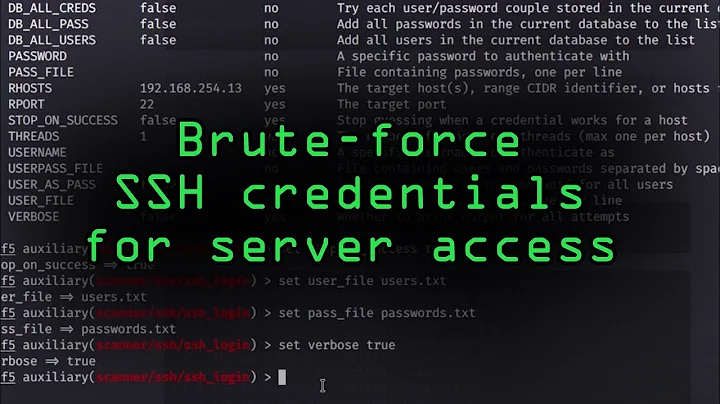Preventing brute force attacks against ssh?
Solution 1
Here's a good post on that subject by Rainer Wichmann.
It explains pros and cons on theses methods to do it :
- Strong passwords
- RSA authentication
- Using 'iptables' to block the attack
- Using the sshd log to block attacks
- Using tcp_wrappers to block attacks
- Port knocking
Solution 2
I use fail2ban which will lock an IP out after several failed attempts for a configurable amount of time.
Combine this with password strength testing (using john (John the Ripper)) to ensure brute-force attacks will not succeed.
Solution 3
Ons small thing you can do is use something like DenyHosts:
http://denyhosts.sourceforge.net/
It uses the built-in hosts.allow/hosts.deny to block out SSH abusers.
Solution 4
- Change the port used (as Trent mentioned)
- Require encryption keys instead of passwords. http://novosial.org/openssh/publickey-auth/
- Blacklist attacker ips
- Whitelist known users to prevent accidental blacklisting. (as Samiuela mentioned)
Solution 5
One of the easiest ways to avoid these attacks is to change the port that sshd listens on
Related videos on Youtube
Comments
-
grieve almost 2 years
What tool or technique do you use to prevent brute force attacks against your ssh port. I noticed in my Security logs, that I have millions of attempts to login as various users through ssh.
This is on a FreeBSD box, but I imagine it would be applicable anywhere.
-
 phirschybar about 15 yearsI have tried this and users find it annoying. If it's only one or two people, this could be a good option, and would nearly eliminate brute-force attacks
phirschybar about 15 yearsI have tried this and users find it annoying. If it's only one or two people, this could be a good option, and would nearly eliminate brute-force attacks -
C. Ross about 15 yearsIf, of course, you system can stand it.
-
Chris Ballance about 15 yearsSecurity through obscurity, effective every single time.
-
Ryaner about 15 yearsWhitelisting is hugely important if you are doing any kind of blacklisting unless you want to get locked out.
-
Chris Ballance about 15 years-1 Ever heard of DoS attacks?
-
Dave Cheney about 15 yearsFail2ban is excellent. It was simple to extend it to monitor /var/log/maillog and get it to ban persistent spammers from hitting my mail server
-
 womble about 15 yearsYeah, because SSH is the only service susceptible to brute force attacks. If you've got a port open to the Internet, it can be used to hammer your machine into oblivion. You probably put your HTTP server on weird ports too, and behind port knocking, to "avoid DoS attacks"...
womble about 15 yearsYeah, because SSH is the only service susceptible to brute force attacks. If you've got a port open to the Internet, it can be used to hammer your machine into oblivion. You probably put your HTTP server on weird ports too, and behind port knocking, to "avoid DoS attacks"... -
dwc about 15 years+1 for having the absolute best answer. Those two things are the only reasonable steps, and they are very effective indeed. Either alone is worthwhile, and both together more so. Boo on the other answers advocating security through obscurity!
-
grieve about 15 yearsI wouldn't mind changing the port all that much, but I have learned that most firewalls (other than my own) tend to lock down all ports other than the common ones (80,22, 443, etc). If I am behind those firewalls I cannot get to my home server on that nonstandard port. For me that is a no go.
-
Araejay almost 15 years@grieve then change our firewall to let that port out?
-
user2910702 almost 14 yearsFail2ban can be combined with an iptables chain that sends tcp traffic to the
TARPITtarget, if you are feeling nasty (from xtables-addons). -
Joshua Enfield almost 14 yearsI might be misunderstanding something, but many mainstream browsers connect between 4-6 connections at a time - even though the HTTP standard sets it at 2.
-
sherbang almost 13 yearsYes, that would be a problem if you were trying to rate-limit port 80. You're not connecting to ssh with your web-browser, and ssh sessions are long-lived sessions that maintain state, not short-lived stateless sessions like http. Parallelizing ssh sessions like that doesn't make sense. That's not to say that there isn't some niche use of ssh that this would break, but it's rare.
-
 paddy over 11 yearsThis solution is not so good if, like me, you are serving Subversion via ssh. A single SVN query can make a great number of connections in quick succession. If providing that service, you could either use a second sshd service on another port, or whitelist known IPs. I am thinking of using fail2ban or sshdfilter to catch obvious attacks the first time around, without punishing my legitimate users.
paddy over 11 yearsThis solution is not so good if, like me, you are serving Subversion via ssh. A single SVN query can make a great number of connections in quick succession. If providing that service, you could either use a second sshd service on another port, or whitelist known IPs. I am thinking of using fail2ban or sshdfilter to catch obvious attacks the first time around, without punishing my legitimate users. -
ZEE about 6 yearsgood to know this option too...




